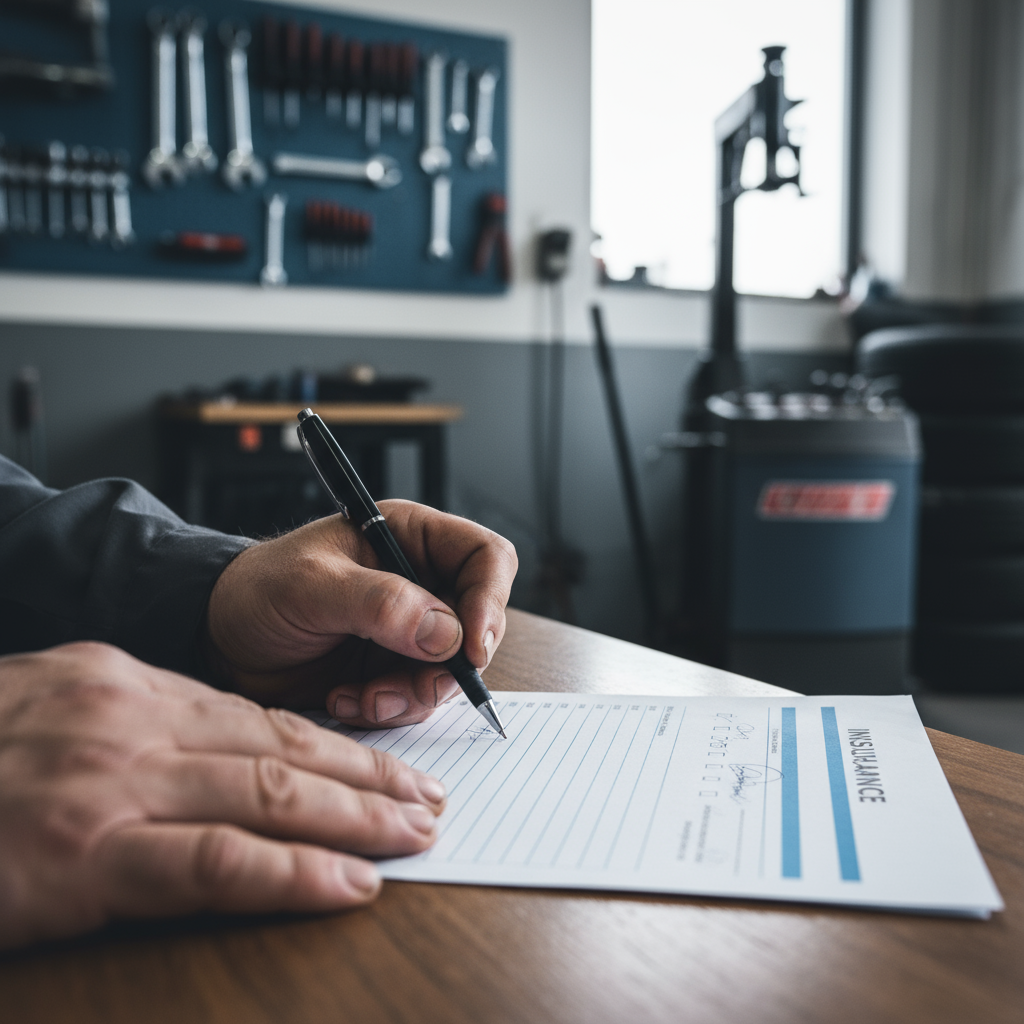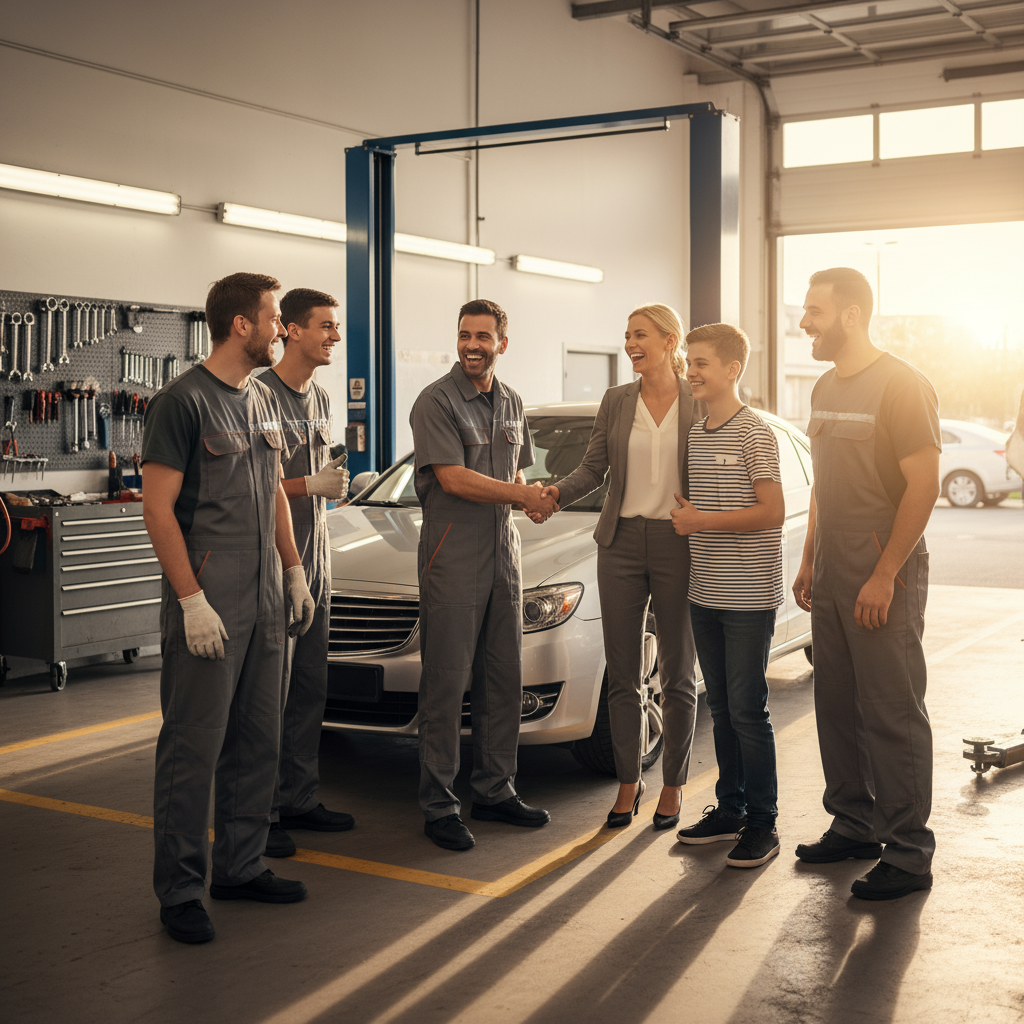
Table of Contents
Introduction
So you’re running an auto repair shop—or thinking about starting one. It’s honest work, and there’s real satisfaction in getting someone’s car back on the road. But let’s talk about the elephant in the garage: the risks that come with this business. Picture this: you’re working on a customer’s prized sedan when your lift malfunctions, sending their car crashing down. Or maybe an employee slips on spilled oil and breaks their wrist. Without the right insurance? These scenarios could shut down everything you’ve built faster than you can say “transmission rebuild.”
Here’s the thing about auto repair shop insurance—it’s not your typical business coverage. You’re dealing with customer vehicles worth tens of thousands of dollars, potentially dangerous equipment, and situations that most other businesses never face. The numbers don’t lie: workplace injuries, customer vehicle damage, and equipment theft top the list of claims that can drain your bank account or land you in court. That’s especially true if you’re just getting started. (New shop owners often underestimate these risks until they face their first major claim.) Our insurance for startups guide dives deeper into early-stage protection strategies that can save your business before it even gets off the ground.
Now, insurance policies can be about as clear as mud. Deductibles, exclusions, coverage limits—it’s enough to make your head spin. But here’s what I’ve learned after years in this industry: you don’t need to become an insurance expert overnight. You just need to understand the basics well enough to protect yourself. Start with our insurance basics guide if this is all new to you. Once you grasp how different policies work together, you’ll stop feeling overwhelmed and start feeling empowered. And trust me, knowing about the various types of insurance available isn’t just helpful—it’s essential for building a protection plan that actually covers your unique risks.
Let’s be honest about money for a minute. Insurance feels like an expense until you need it. But the financial side goes deeper than just monthly premiums. Take deductibles, for example—they directly impact both what you pay upfront and what you’ll owe if something goes wrong. Understanding insurance deductibles can help you balance coverage costs with your shop’s cash flow. And while we’re talking finances, concepts like compound interest might seem unrelated, but they actually show how smart financial planning (including insurance) can protect and grow your business over time. Bottom line? Combining insurance smarts with solid financial planning keeps your shop both protected and profitable.
What You’ll Learn in This Guide
We’re going to walk through everything you need to know about insuring your auto repair shop. Whether you’re starting from scratch or looking to improve your current coverage, you’ll find practical advice you can actually use.
- Types of Insurance Needed: We’ll break down the specific policies your shop needs—general liability, property coverage, workers’ compensation, garage keepers, and business owner policies. You’ll learn what each one actually does and why it matters for your day-to-day operations.
- Importance and Benefits of Insurance: Discover why insurance isn’t just another business expense, but a smart investment that protects your shop, keeps you legally compliant, and preserves the reputation you’ve worked hard to build.
- Choosing the Right Insurance: Get practical tips for selecting coverage that fits your shop’s unique situation, from assessing your specific risks to comparing providers and reading the fine print like a pro.
- Managing Common Risks and Claims: Learn about the most common insurance claims auto repair shops face and how to handle the claims process smoothly, including how to spot and prevent fraud.
As we dig into each topic, you’ll develop a clear strategy for choosing insurance that matches your shop’s size, risk level, and budget. Many shop owners also find it helpful to understand insurance requirements for small businesses—these legal requirements can trip you up if you’re not prepared, and gaps in coverage can be costly.
Here’s what I want you to remember: insurance isn’t just paperwork you file away and forget about. It’s a crucial part of your business strategy that protects everything you’ve worked for. By the time you finish reading this, you’ll feel confident tackling insurance decisions and know exactly when to call in the experts for help.
Maybe you’re trying to make sense of your shop’s financial statements (check out our guide on analyzing financial statements for some clarity there), or perhaps you’re dealing with an active claim and need to understand the process better (our claims process guide has you covered). Whatever brought you here, consider this your go-to resource for securing your auto repair shop’s future. Ready to get started? Let’s dive in.

Running an auto repair shop? Then you know the risks are real—and they’re everywhere. From a customer’s car getting damaged while in your care to an employee getting hurt on the job, there’s a lot that can go wrong. Fast. While we touched on insurance basics earlier, let’s get into the nitty-gritty of what your shop actually needs. We’re talking about the specific insurance types that can make or break your business, and more importantly, how to choose coverage that actually fits your unique situation. Because here’s the thing: the right insurance doesn’t just protect your business—it gives you the freedom to focus on what you do best without constantly worrying about what might happen next.
Essential Types of Insurance for Auto Repair Shops
Let’s be honest—picking insurance for your auto repair shop isn’t exactly thrilling. But it’s absolutely critical. You’re looking at several key types: general liability, property insurance, workers’ comp, garage keepers insurance, and business owner’s policies (BOPs). Each one tackles different risks that could otherwise crush your business financially. Think of it as building a safety net with multiple layers—because accidents, theft, and lawsuits don’t usually give you a heads up. If you want to dig deeper into the fundamentals, checking out essential types of insurance will give you a solid foundation to work from. The key is matching your coverage to your shop’s size, the services you offer, and what your local regulations require.
Here’s what makes auto repair shops different: you need policies designed for your specific headaches. Take garage keepers insurance—that’s not something a typical retail store worries about, but for you? It’s essential. You’re responsible for customer vehicles, and that’s a whole different ball game than standard commercial coverage. Want to brush up on how insurance actually works? The insurance basics guide breaks down how policies function and what drives your costs.
Key Aspects of Auto Repair Shop Insurance Types
Alright, let’s break down what each of these insurance types actually does for you:
- General Liability Insurance: This is your first line of defense against third-party claims. Someone gets hurt in your shop? Property gets damaged? Legal fees start piling up? General liability steps in to cover bodily injury, property damage, and those attorney bills that can get scary expensive, fast.
- Property Insurance: Your tools, equipment, and building are your livelihood. Fire, theft, vandalism—any of these could shut you down if you’re not covered. Property insurance makes sure you can repair or replace what you need to keep the doors open and the work flowing.
- Workers’ Compensation Insurance: In most places, this isn’t optional—it’s the law. When your employees get injured (and in auto repair, it happens), workers’ comp covers their medical bills and lost wages. It protects them and keeps you compliant with labor regulations.
- Garage Keepers Insurance: Here’s the big one for auto shops. Customer cars under your care can get stolen, vandalized, or damaged while they’re on your property. Regular insurance won’t touch this—you need garage keepers coverage to protect those vehicles and your reputation.
Pro tip: A business owner’s policy (BOP) can bundle your general liability and property insurance at a better rate than buying them separately. It’s like getting a combo meal—more convenient and usually cheaper. Just make sure whatever you choose actually covers your specific risks and meets local requirements.
Now that you know what’s available, let’s talk about why having the right insurance mix isn’t just smart—it’s absolutely essential for your business.
The Critical Importance and Benefits of Insurance for Auto Repair Shops
Look, insurance isn’t just about checking boxes or meeting legal requirements—though those matter too. It’s about survival. One major claim without proper coverage? That could be game over for your business. But when you’re properly insured, you can sleep better knowing that unexpected disasters won’t wipe out everything you’ve built. Your customers notice this confidence too. They trust shops that have their act together, and that trust translates into repeat business and referrals.
There’s also the compliance angle you can’t ignore. Operating without required insurance can mean fines, license suspension, or even forced closure. Nobody wants that headache. Plus, understanding things like insurance deductibles helps you balance your premiums with out-of-pocket costs, so you’re not overpaying for coverage or leaving yourself exposed.
Key Benefits of Insurance for Your Auto Repair Business
Here’s what proper insurance coverage actually delivers for your shop:
- Financial Protection Against Unexpected Losses: When accidents happen—and they will—insurance prevents them from becoming business-ending financial disasters. It keeps your cash flow stable and your business alive, even when facing expensive lawsuits or major property damage.
- Legal and Regulatory Compliance: Stay on the right side of the law without the stress. Required coverage keeps regulators happy and prevents costly shutdowns, fines, or legal trouble that could destroy your reputation and bottom line.
- Enhanced Business Reputation and Customer Confidence: Customers want to work with responsible businesses. When you’re properly insured, it shows you’re professional and prepared—qualities that encourage repeat customers and positive word-of-mouth referrals.
- Support for Employee Well-being and Retention: Good insurance shows your team you care about their safety and security. Happy, secure employees stick around longer, work harder, and help create the positive culture that drives business success.
Bottom line? Insurance isn’t an expense—it’s an investment in your business’s future. With the right coverage in place, you can focus on growing your shop instead of constantly worrying about what could go wrong. The next step is finding the right insurance partner who understands your business and can deliver coverage that actually works when you need it most.

Here’s the bottom line: insurance isn’t just another business expense for your auto repair shop—it’s your lifeline. Think about it. You’ve got customer cars worth thousands rolling in and out every day. Equipment that could crush someone if something goes wrong. Employees working with heavy machinery and hazardous materials. Without the right coverage? One bad day could wipe out everything you’ve built.
General liability keeps you covered when accidents happen (and they will). Garage keepers insurance? That’s your best friend when Mrs. Johnson’s BMW gets dinged while it’s in your care. But here’s what most shop owners miss—understanding your deductibles, coverage limits, and those sneaky exclusions buried in the fine print. That stuff matters. A lot.
Now, let’s talk about staying legal. Workers’ comp isn’t optional—it’s the law. Same goes for meeting your state’s small business insurance requirements. But compliance isn’t just about avoiding fines. When customers see you’re properly insured, they trust you more. When employees know they’re protected, they work with confidence. It’s a win-win that actually helps your business grow.
So where do you start? Take a hard look at your shop. How big is it? What services do you offer? Are you just doing oil changes, or are you rebuilding engines? Every operation has different risks. Once you know what you’re dealing with, you can build coverage that actually fits—not some cookie-cutter policy that leaves gaps everywhere.
Don’t go it alone, either. Find an insurance provider who gets the auto repair business. They should understand why you need garage keepers insurance, not ask “What’s that?” when you bring it up. And please—learn how the claims process works before you need it. Trust me, you don’t want to figure that out while you’re dealing with an emergency.
Need some extra guidance? Our insurance for startups guide is perfect if you’re just getting your shop off the ground. New to insurance altogether? Start with the insurance basics—it’ll give you the foundation you need to make smart decisions. Want to save money without sacrificing protection? Understanding insurance deductibles is key to finding that sweet spot. And when something does happen, knowing the insurance claims process inside and out will save you time, stress, and probably money too. Oh, and here’s something most people overlook—building an emergency fund alongside your insurance coverage. It’s like having a safety net for your safety net.
Look, running an auto repair shop is tough enough without worrying about what could go wrong. But that’s exactly why good insurance matters so much. It’s not about being pessimistic—it’s about being smart. When you’re properly covered, you can focus on what you do best: fixing cars and taking care of customers. So do your homework, ask questions, and don’t cut corners. Your future self (and your family) will thank you for it.
Frequently Asked Questions
-
What types of insurance are mandatory for auto repair shops?
- General liability and workers’ compensation insurance are often required by law to protect your business, employees, and customers.
-
How can insurance help with customer vehicle damage claims?
- Garage keepers insurance covers damages to customer vehicles while they are in your possession, safeguarding your business from costly claims.
-
Can I combine multiple coverages in one policy?
- Yes, a Business Owner’s Policy (BOP) combines general liability and property insurance into one package, often at a lower cost than separate policies.
-
What should I do after an accident at my shop?
- Contact your insurance broker promptly, document the incident thoroughly, and follow your insurer’s claims process to ensure proper handling.


